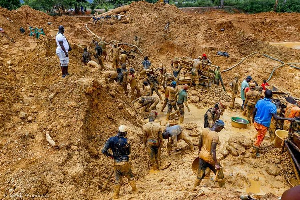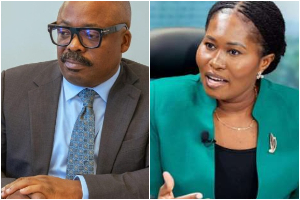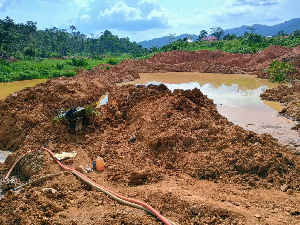The issue of galamsey (illegal mining) has been weighing heavily on my soul for some time now due to its potential to annihilate the existence of Ghanaians. We are on the verge of selling our destiny to wreckers whose only interest is to make money without regard for how they achieve it. This is a delicate and critical issue that demands everyone’s attention.
Ghana, like many other countries, is blessed with abundant natural mineral resources such as gold, diamonds and bauxite, which should provide numerous opportunities for its people when managed properly. Sadly, that is not the case. Many miscreants are perpetuating the evil of galamsey in the name of mining.
Ghana has been mining gold for decades, dating back to the days of the Gold Coast, yet there has been little concern about the degradation of our water bodies and environment, thanks to the restrictions and regulations imposed on large-scale miners.
In recent years, however, the mining landscape has changed drastically, as new methods of mining have profoundly affected our water bodies and ultimately, our survival. These criminals, instead of mining where they have been permitted to operate, are exploiting water bodies, causing significant harm to residents and the nation as a whole.
The menace of galamsey has become a national concern due to its threat to human life. These illegal miners care little for the survival of Ghanaians, focusing solely on their parochial interests and how to fill their pockets. They mine in water bodies from which they are supposed to maintain a safe distance, resulting in pollution that renders the water unfit for use. Tragically, these contaminated water sources are vital for the livelihoods of many, especially those living in surrounding communities.
How did we get here as a country? Who is responsible for these atrocities? How do we tackle this canker head-on? Answering these questions could help us as a country move closer to solving this problem.
In response to the first question, a high unemployment rate has driven many into this destructive venture, which threatens our very existence. Many communities where these illegal activities occur lack viable employment opportunities, leaving them with little choice but to engage in this work.
I acknowledge that unemployment is indeed a national crisis, as both past and present governments have failed to create lucrative job opportunities for citizens. However, can we trade unemployment for the degradation of our water bodies?
Who, then, is responsible for these harmful acts, and why do they persist? While it is difficult to pinpoint a specific individual or group, responsible and good leadership is crucial. In every community in Ghana where illegal mining takes place, there are traditional leaders or chiefs who are custodians of these water bodies.
They bear the primary responsibility for their preservation, as these resources are an inheritance from their ancestors. Unfortunately, some selfish and greedy chiefs prioritise their own interests over the well-being of their communities and the resources entrusted to them.
Moreover, community members share in this responsibility. Foreign nationals do not know where these resources are located; it is local people who guide them there. What has happened to community vigilantism, where members act as watchdogs over their people and resources? By turning a blind eye, they continue to sell their destiny and that of future generations.
Aside from the traditional leaders who have turned a blind eye to this menace for their own gain, this issue cannot be discussed without addressing the role of politicians. Politics is undermining every fibre of our existence in this country. I will dig deeper into this matter in a future article, but for now, let us focus on how politicians have sold our country to unscrupulous foreign nationals who are destroying our lands and water bodies without restraint. Some of these politicians’ own concessions and mine without regard for the laws governing operations.
The president swore an oath to protect human life and all property in the country, yet when it comes to galamsey and the protection of our water bodies, he has fallen short. He hesitates to confront this issue because his party’s bigwigs are often the chief orchestrators of the degradation. The president is sleeping and does not know what is going on.
Addressing the last question of how to tackle this menace is crucial. We need bold leadership to confront this challenge. We are behaving as if we live in a banana republic. The president has not demonstrated sufficient leadership on this critical matter. Do you remember when he claimed he was ready to risk his presidency to fight galamsey?
What happened to that eye-serving statement from him? When reality set in and he realised he had an election to win, he went back to sleep. We cannot govern a country with mere rhetoric; we need a determined will to take action.
Beyond those mentioned, the biggest culprit is the president of the nation. This article is not suggesting that the president engages in galamsey, but he is meant to be the chief protector of everything we hold dear in Ghana. His failure to call these individuals to order and ensure they are held accountable makes it difficult to exonerate him.
The dangers awaiting the country if this issue is not tackled head-on will far exceed the destruction that occurred in Sodom and Gomorrah. We are gradually digging our graves and burying ourselves. A recent report highlights some of the effects of illegal mining: babies born with deformities and pregnant women losing their pregnancies as a result. Galamsey has become an albatross around our necks as a nation, and the sooner we confront it, the better. We need bold leadership both at the national and community levels.
Interestingly, no developmental project takes place in Ghanaian communities without the involvement of traditional leaders, prompting one to wonder how these foreign nationals and local illegal miners gain access to mining sites.
To remove this albatross (galamsey) from our necks, we must unite as a country and fight this battle together. While some individuals—chiefs, the president, and politicians—hold more power and influence, they cannot succeed without the support of the citizens. It is not the work of one individual. This is where the president and chiefs must demonstrate leadership by rallying everyone to combat this canker.
To what extent can we sell our destiny? What will become of us as a country “if we lose our water bodies but gain all the money in the world?” This article is a clarion call to our president, traditional leaders, citizens and everyone in Ghana to wake up and speak out against the atrocities going on in our nation. Even in the animal kingdom, there is law and order; how much more so among humans? If we do not stand against this canker that is eroding the very fabric of our existence, we risk a future without hope, and posterity will judge us harshly.
Opinions of Saturday, 5 October 2024
Columnist: Sampson Boamah















